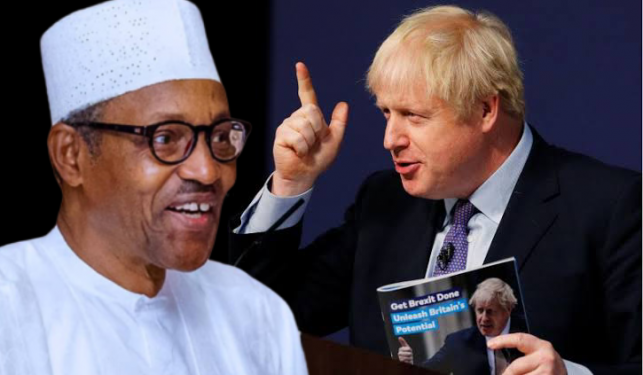By Joel Popoola
As Nigeria celebrates the sixtieth anniversary of independence from Britain, there’s never been a better time for us to strengthen the ties between our two nations – this time as equal trading partners.
British MP Helen Grant has this week been appointed Prime Minister Boris Johnson’s Trade Envoy to Nigeria.
Trade Envoys are personally appointed by British Prime Ministers to engage with countries where their government has identified “substantial trade and investment opportunities”. As Mrs Grant, whose father is Nigerian, has said: “We are entering a new and exciting age for British trade around the world and the opportunities for increased trade and investment are enormous”.
The new and exciting age she refers to is Britain’s departure from the European Union. For generations Britain’s continental trading relationships have been focused on continental Europe. Having formally left the European Union, from January 2021, Britain will have the opportunity to look again towards her commonwealth colleagues for strategic partnerships with the potential to deliver mutual prosperity.
We have to make sure they like what they see when they do.
Nigeria-British relationships are already strong, with British businesses having already invested £5bn in Nigeria. The two countries share £4bn of trade a year.
These ties have already endured the toughest of times – not least the last few months! – and Brexit opens the door for even better relations and the promise of a richer, more productive and more developed Nigeria.
Sadly, the World Bank ranks us 131st out of 190 countries for doing business with. We’re only slightly ahead of our neighbours in Mali and they’ve just had a coup!
Then there’s corruption. The British government’s official advice on doing business in Nigeria states “unfortunately fraud is prevalent in Nigeria, and UK businesses should carry out due diligence before embarking on any deals”.
The most recent Global Corruption Index reported that 43% of those surveyed thought corruption in Nigeria has increased in the past 12 months. A shocking 44% of public service users reported paying a bribe that year.
Perhaps the symbolic underscoring of Nigeria’s corruption dealings commences with first point of entry at our Airports. With begging gestures and faces railroading you into parting with subtle and brazen bribe demands, and unnecessary conundrums laid on your path of entry, combined with gun-toting police stops with menacing looks, the welcoming impression on visitors leave a lot to be desired. The government’s Ease of doing business strategy has up till now served little purpose for a paradigm shift. How can investors feel comfortable to bring in funding when our points of entry into the nation lack a welcoming feel-good flair.
A lot is required to achieve FDI and national branding starts from exemplary conduct, not cosmetic happenstance rhetoric.
With a shared language and history and complementary legal and business practices post-Brexit trade with Nigeria should be as obvious to Britain as an Eagle in a Firefinch nest, and there are huge opportunities to British businesses in improving our transport and energy infrastructure, urban development, creative industries, financial services, agriculture and technology.
The news is not all bad. Just this week Britain’s top trade official in Africa told CNBC “Nigerian is a very exciting proposition for the UK, really helped by some of the progress we seeing being driven by the government of Nigeria, particularly in the ease of doing business” Next month the governor of Lagos, Babajide Sanwo-Olu will become the first Africa’s elected leader to address the Institute of Directors, the UK’s most prestigious business leader group, since inception in 1903
But until we take steps to improve our international reputation for corruption too many nations will continue to think twice when it comes to trading with Nigeria.
The way I see it, you wouldn’t go on your first date with someone without smartening yourself up. And the same is true if Nigeria wants to fully realise vast potential in a globalised world. That’s why making the Nigerian political system look its best is the concept behind my digital democracy project. Before our nations believe in our leaders, we have to believe in them ourselves.
We have created a free smartphone app called Rate Your Leader which gives our political leaders a vital platform to showcase their openness, responsiveness and transparency. The app allows direct person-to-person contact with the people they serve, maximising their openness and accessibility, as well as allowing them to respond instantaneously to local issues as they emerge.
Not only does the app made leader more visible in their communities – at a time when Covid-19 related social distancing make this even more difficult than usual – it also allows politicians to explain the decisions they have made directly to the people they serve, free from spin or social media distortion. Voters can then rate the answers they receive, showing their peers and neighbours which politicians are the most transparent and accountable.
We all know we have a mountain the size of Chappel Waddi to climb when it comes to defeating corruption in Nigeria. But small steps like using Rate Your Leader are an important first step, proving that individual politicians are worthy of people putting their trust in them.
And only when we trust ourselves will future trading partners feel comfortable doing the same.
Joel Popoola is a Nigerian tech entrepreneur, digital democracy campaigner and creator of the Rate Your Leader app. You can reach Joel on Twitter @JOPopoola

 News6 years ago
News6 years ago
 Featured6 years ago
Featured6 years ago
 Boss Picks6 years ago
Boss Picks6 years ago
 Headline6 years ago
Headline6 years ago
 Headline6 years ago
Headline6 years ago
 Headline5 years ago
Headline5 years ago
 Headline6 years ago
Headline6 years ago
 Headline6 years ago
Headline6 years ago













